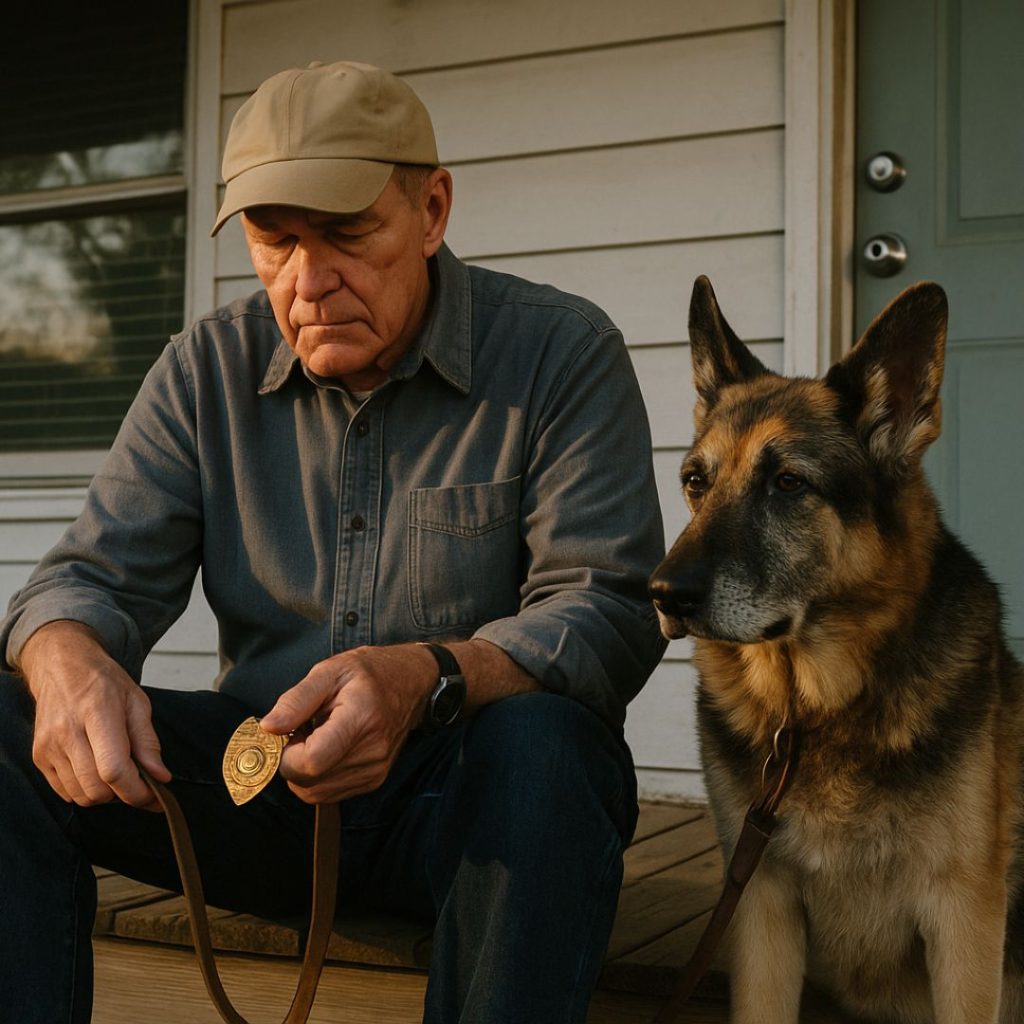He still kept the old badge in a drawer, right next to the leash.
The house was quiet now—no dispatches, no sirens—just two old souls waiting for one last call.
Sometimes at night, he’d whisper into the silence, pretending the radio still worked.
But when the neighbor’s scream pierced the stillness, it wasn’t the officer who moved first.
It was the dog who remembered what duty meant.
🐾 The Last Radio Call — Part 1: “Still on Patrol”
The mornings were the hardest.
Gerald “Gerry” McCready had once woken each day to the crackle of a radio and the grumble of an engine warming up in the driveway. Now, it was just the tick of the kitchen clock and the occasional wheeze of his aging lungs. He still rose at 5:30 a.m. sharp, out of habit more than need, pulling on the same boots he’d worn for twenty-five years on the Chattanooga police force.
Beside the door sat a leash—faded leather, cracked near the clasp—and a pair of cloudy brown eyes watching his every move.
“Come on, Rex,” Gerry muttered, his voice gravelly with age.
The dog rose slowly, joints stiff from years of running, leaping, serving. Rex was a German Shepherd, twelve years old now, his once-black muzzle dusted with gray. He walked with a limp, his back right leg never fully healing after that last bust on Lookout Mountain. Still, he followed Gerry loyally, every morning, down the sidewalk and around the block, like a ghost routine from the life they used to live.
To the neighbors, it was just an old man walking an old dog.
To Gerry, it was patrol.
They passed the Hendersons’ rosebushes, waved at young Lisa Green unloading groceries, nodded at Mr. Alvarez, the mailman. Every house, every corner still carried echoes of old calls—domestic disputes, barking complaints, a runaway teen once found hiding in the McCormick shed. And through it all, Rex had been there, beside him, alert, dependable.
Back then, Rex was the muscle behind the badge. Smart. Focused. He could sniff out narcotics from a mile away and once tracked a missing child through two muddy fields and a creekbed. Gerry still remembered the look on that mother’s face when Rex barked from under the broken porch.
But those days were long gone.
Now, the badge sat in a drawer beneath Gerry’s socks. The radio was boxed up in the garage. And Rex, bless him, spent most afternoons snoozing on the porch, his ears twitching at birds more than burglars.
Still, there were things Gerry couldn’t let go of. The discipline. The watchfulness. The sense that they were still needed.
“You see that squirrel?” Gerry would whisper with a grin during their walks. “Might be casing the place. Better keep an eye on him.”
Rex would grunt, tail thumping once against the concrete, as if indulging his old partner’s humor.
But beneath the playfulness, Gerry felt it—that tug of loneliness. The quiet ache that came with being past your purpose. He’d been widowed five years ago. His son, Daniel, lived out in Phoenix, busy with grandkids and the tech world. They called once a week, maybe. It wasn’t bad. Just… distant.
And some nights, when the wind curled around the eaves and the world seemed too still, Gerry would sit in his recliner, the lights off, and hold the old radio in his hands. He’d flick it on, just to hear the static. Pretend it was still active.
“Unit 14,” he’d whisper, “K9 on scene.”
No one answered. But Rex, from the corner of the room, would lift his head. He always heard.
Then one evening, just after sunset, something happened.
It had been a normal day. The walk, the mail, the old western reruns on TV. Rex was asleep under the window, his breathing slow and shallow. Gerry had just heated a bowl of leftover stew when a sharp, panicked scream shattered the calm.
It came from next door.
Lisa Green.
Young, single, worked long hours. She’d waved every morning. Gerry dropped the bowl, stew splashing across the tile.
He reached for his phone, heart pounding.
But Rex was already up.
The old shepherd’s ears were sharp, his nose twitching. He let out a low bark—deep, urgent—and hobbled toward the front door.
“Rex, wait!” Gerry called, grabbing the leash, fumbling with the door handle.
But the dog was moving, faster than Gerry had seen in months. Something had lit up behind those cloudy eyes. Not just instinct—training.
Gerry followed, as fast as his bad knee would allow, across the lawn and toward the Green house, where the porch light swung wildly and the front door stood ajar.
He called Lisa’s name, heard only rustling from inside.
And then—another sound.
A sharp growl.
From Rex.
Then something else: a man’s voice, harsh, threatening.
Gerry’s stomach dropped.
He had no badge, no backup.
Just an old leash.
And an old dog who, against every limit of age and injury, had gone in first.


